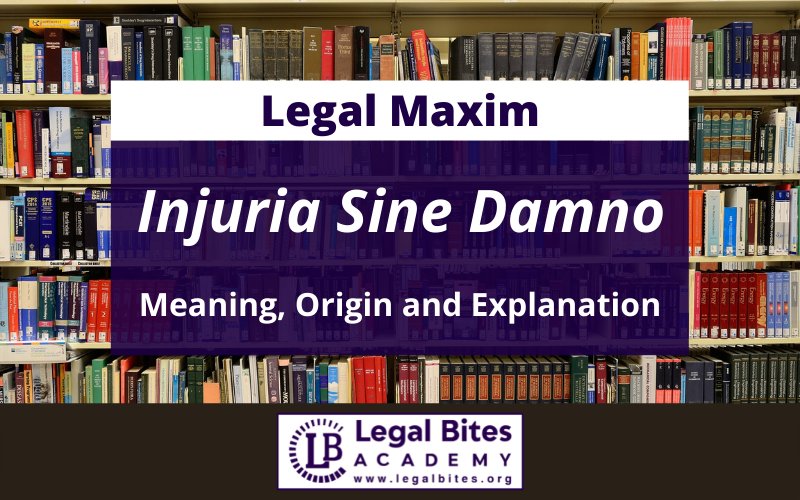This article titled ‘Injuria Sine Damno: Meaning, Origin and Explanation’ is written by Sahajpreet Bhusari and discuss the concept of Injuria Sine Damno I. Meaning and Origin Injuria Sine Damno is a legal term of Latin origin. In Latin, the term literally means “injury without damage”.[1] II. Explanation Injuria sine damno is an infringement of a legal right without injury, loss or damage to the claimant. Whenever a legal right is violated, the assignee has the right...
This article titled ‘Injuria Sine Damno: Meaning, Origin and Explanation’ is written by Sahajpreet Bhusari and discuss the concept of Injuria Sine Damno
I. Meaning and Origin
Injuria Sine Damno is a legal term of Latin origin. In Latin, the term literally means “injury without damage”.[1]
II. Explanation
Injuria sine damno is an infringement of a legal right without injury, loss or damage to the claimant. Whenever a legal right is violated, the assignee has the right to sue.
III. Application
Everyone has an absolute right to his or her property, immunity and personal freedom, and violations of this right can be prosecuted on their own. A person who opposes a legal right that has been violated has a cause for action to the extent that willful violation of any legal right results in a cause for action. The law even grants the liberty that if a person is merely threatened with a violation of a legal right even if the wound has not been terminated, the person whose right is threatened can take an action as per the law.
IV. Illustration
If a person is unjustly detained against his or her will, he or she can claim substantial damages from wrongful detention, even if no loss was incurred during the detention period.
V. Important Case Laws
As cited in the case of Ashby v. White[2], of which the plaintiff was a qualified voter in the congressional elections taking place at the time. The defendant, a returning employee, falsely refused to obtain the plaintiff’s vote.
Plaintiff has no prejudice because the candidate he wanted to vote for won the election, but nevertheless, the defendants are liable. It is concluded that the damage is not just money, but that the damage is legal damage suffered, therefore when a person is injured in his right he is entitled to remedy for the same.
Injuria sine Damno is even applicable in cases of infringement as has been observed in the case of Sain Das v. Ujagar Singh[3] that nominal damages are usually awarded and that the principle of injuria sine damno applies to real estate where there is trespasses on another’s property.
References
[1]Injuria Sine Damno and Damnum Sine Injuria, Available Here.
[2] (1703) 92 ER 126.
[3] AIR 1940 Lah 21.
- Law Library: Notes and Study Material for LLB, LLM, Judiciary and Entrance Exams
- Legal Bites Academy – Ultimate Test Prep Destination



